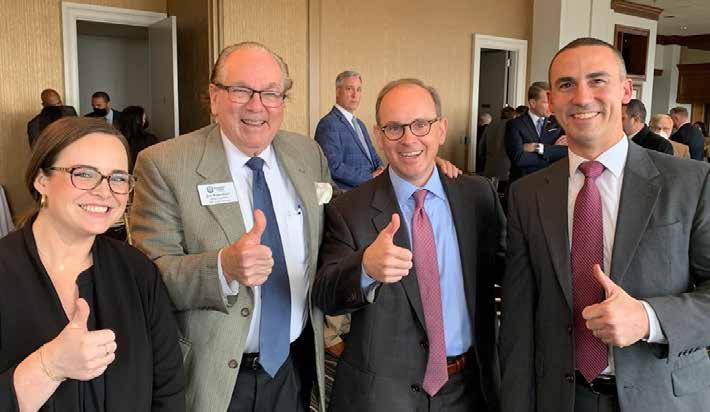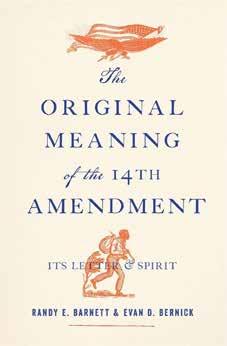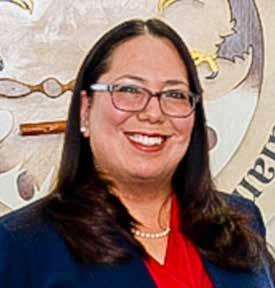
6 minute read
At Sidebar
The Virtues of Latin for Lawyers
By Jon J. Lieberman
Advertisement
Jon J. Lieberman is a member of the editorial board of The Federal Lawyer and currently serves on the Executive Committee of the FBA Bankruptcy Law Section. He is a partner and chair of the Financial Institutions Litigation and Regulatory Compliance Department at Sottile & Barile LLC in Cincinnati. © 2022 Jon J. Lieberman. All rights reserved. As the jam-packed Cincinnati Metro bus carried me to my first day of classes at Walnut Hills Jr. and Sr. High School back in 1976, I was quite apprehensive about attending one of the finest public college preparatory schools in the country. Of particular concern were the horror stories I had been told about Walnut’s Latin language course requirement for both effies and e-flats. (That’s what 7th and 8th graders were called there back then.) I heard those courses were grueling, and the purpose of them unknown. “Latin is a dead language. Dead as dead can be. First it killed the Romans. And now it’s killing me.” That’s what I remember students singing on the bus that warm September morning. But how wrong that song turned out to be.
Actually, not only did I survive those early Latin courses, but I thrived. So much so that when my freshman year of high school rolled around, while a vast majority of the student body gladly switched over to studying a “modern” language, such as Spanish, French, or German, I stuck with Latin. I reveled in the study of Vergil, Catullus, Horace, and Ovid for the next four years. It actually got to the point where the Latin faculty basically created classes just for me. I had received the highest awards on the National Latin Exam, traveled throughout the country for the National Junior Classical League, and was invited to all the best toga parties. Yet, as graduation approached, stark reality hit me. How was any of this Latin in any way relevant to the real world? Listening to my contemporaries, I began to think that maybe it was just a big waste of time—well, except for the toga parties.
I decided to spend the summer before my senior year in Washington, D.C., interning for Rep. Lyle Williams, R-Ohio. That experience was life changing. I got to drive the congressman, along with a famous constituent, the boxer Ray “Boom Boom” Mancini, to the White House for a photo op with President Reagan (I never got out of the car, but Boom Boom did punch me real hard after I asked him to—I thought I punctured a lung), and I flew in a humongous C- 5 Galaxy transport at Andrews Air Force Base during House appropriations hearings. Before I left Washington, my life path was set. I decided that I was going to Georgetown University and would then work on Capitol Hill as a defense analyst. My last year at Walnut Hills was going to be the best.
So, you can imagine my mixed emotions when Mrs. Kessis, my favorite Latin teacher, broke her “fantastic news” to me six months prior to graduation: I had been awarded the full-tuition Louise Taft Semple Classics Scholarship by the University of Cincinnati and was being offered a year’s worth of college credit for my Latin classes and test scores. Well, it wasn’t Washington, but Latin paid for my college.
Three years later, my father pinned on my Second Lieutenant “butter bars” when I was commissioned as a Distinguished Military Graduate of Air Force ROTC Detachment 665 at the University of Cincinnati. Again, I pondered the same question in a different form: “How was any of this Latin relevant to an Air Force officer?” I realized the answer to that very quickly.
Life is funny, and lo and behold, I received a special duty assignment to the headquarters of the Air Force Office of Special Investigations at Bolling Air Force Base in Washington, D.C. I was assigned to the Current Operations Center and was responsible for briefing senior commanders on critical events that happened around the world. I also had the opportunity to create literally hundreds of security passwords, which, of course, I made sure were in Latin. Well, it wasn’t exactly James Bond-type stuff, but Latin did make things a little more secure for the free world.
Then came law school and, as of May 18, 2022, 30 years as a practicing lawyer. Once again, Latin has played a major role in my life. The study of Latin has enhanced my critical thinking as a lawyer. It has taught me patience, attention to detail, and precision. It has deepened my communication skills and helped me when I’ve struggled to find just the right words to express a thought. It has improved my English vocabulary. It has helped me read, write, and speak with confidence and decipher new thoughts quickly.
My most memorable “Latin moment” occurred while arguing an appeal of a bankruptcy appellate panel decision before the Sixth Circuit Court of Appeals. I did my homework ahead of time and learned that one of the Sixth Circuit judges had been a classics major while attending Vanderbilt University. Well, of course, I made sure to include quite a few Latin phrases into the answer to a really tough question she posed. I don’t know that it played a significant role in the positive outcome, but the judge and I spent a good
amount of time discussing my use of Latin, and she ran out of time to ask me any more tough questions. Latin has been very, very good to me. I encourage every future and practicing attorney to learn a little Latin. It can go a long way.
Chair Lofgren and other members of Congress to refine the bill as the process continues.
Congress has successfully established independent Article I courts in other settings where executive policymaking and priority-setting also involve impartial adjudication, such as the Tax Court, the Court of Appeals for Veterans Claims, and the Court of Appeals for the Armed Forces. Like EOIR, they were originally housed within civilian or military bureaucracies but faced similar concerns about fairness and impartiality. In each instance, Congress transferred the adjudicative functions to independent Article I courts, leaving the agencies’ other processes intact.
Other proposed solutions were considered, including creating a separate executive agency or placing the immigration courts within the Article III court system. But as Betty Stevens explained, those options were rejected because “the former would simply relocate but not eliminate the bureaucratic problems, and the Judicial Conference of the United States opposes the latter.” Simply put, the best option is an independent Article I immigration court.
Chair Lofgren’s filing of the bill was critical, but only the first step in the process of implementing this important reform. The FBA cannot rest on its laurels—FBA members must continue to educate both Congress and the public about the problems and the proposed solution in order to build the necessary support and momentum to move the bill from right idea to reality.
President's Message continued from page 3
paying dues. We invite all active, senior, and retired judges of the federal bench to accept their honorary membership by completing a quick form at www.fedbar.org/honorary.
Beltway Bulletin continued from page 4
Editorial Policy
The Federal Lawyer is the magazine of the Federal Bar Association. It serves the needs of the association and its members, as well as those of the legal profession as a whole and the public.
The Federal Lawyer is edited by members of its Editorial Board, who are all members of the Federal Bar Association. Editorial and publication decisions are based on the board’s judgment.
The views expressed in The Federal Lawyer are those of the authors and do not necessarily reflect the views of the association or of the Editorial Board. Articles and letters to the editor in response are welcome.
ARE YOU A SUSTAINING MEMBER?
Support
Sixty dollars of every sustaining membership is used to support educational programs and publications of the FBA.
Save
Sustaining members save 5 percent on national event registrations and publications orders.









